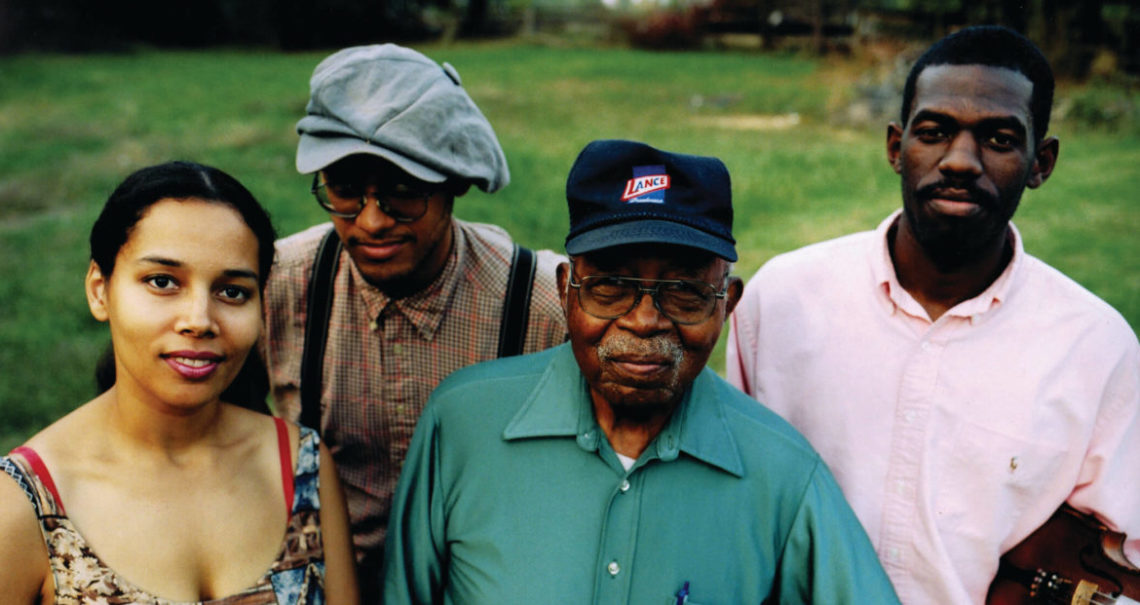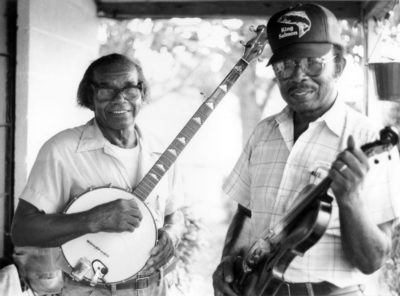Back to: Lesson Pack #1
- You must enroll in this course to access course content.
This tune has an accompaniment video. You can slow down or speed up any of the videos to make them more useful.
Lesson Two: Old Corn Liquor and the Shuffle
As you practice the shuffle and the opening long down bow of the A part notice how it starts on the “off” beat before the first down beat. This is very common in old time music and it’s important that you don’t switch the first note to the down beat. This is a form of Syncopation, which I define as “accenting the off beat”. This and the next three rhythms in this series will be played this way, starting on the off beat. The Shuffle can be played either syncopated or square depending on whether you start it on the downbeat or the off beat. In this case we are playing it syncopated.
Old Corn Liquor
Old Corn Liquor is a version of the popular tune Shortening Bread, here played by Joe and Odell Thompson
Lyrics:
I got drunk and fell off the wagon,
Old corn liquor got me draggin’
Who’s been here since I’ve been gone?
Yea, hey little pretty girl with a red dress on.
I got drunk and lost my hat,
Old corn liquor was the cause of that.

Joe Thompson
That’s what this music is—the roots. All [music today] comes from the roots, all the way from the 1800s. Daddy was born in 1879, and he learned this as a kid, and I know my granddaddy played it. But now, someone has got to stand up and play this. Man, this is history.” —Joe Thompson
Joe Thompson (December 9, 1918 – February 20, 2012) spent most of his life living near the town of Mebane in Alamance County, North Carolina, where his family farmed tobacco. Joe’s father and uncle often played music after the day’s farm work was done, and they also played together for local square dances. Growing up, Joe and his brothers spent countless evenings lying on the floor listening to their father’s fiddle music. It was only natural, Joe thought, for them to learn from what they witnessed and to want to become musicians themselves.
“Well, it was in the family. It was in the family so strong. All of us did it, my brothers, the cousins and all of them did it. We grew up in it. I learned how to play the music from my father. He was a great musician, as were his brothers. My older brother [Nate] learned when he got big enough—he was playing the banjo, so I took on the fiddle.”
When Joe was a little boy of five or six, he already knew he wanted to play fiddle. However, his family members were less enthusiastic than he was. “You can’t play no fiddle!” his brother Nate would scoff, and his father warned him not to touch his fiddle, sure that Joe was too little and would break it. For a while, Joe resorted to using his father’s fiddle whenever the farmhouse was empty. An uncle soon noticed his interest and gave him a small fiddle of his own.
Joe remembers walking the four miles home from his uncle’s house carrying the fiddle in a flour sack, thinking to himself with every step, “I’m gonna show everybody!” At home, he took a pair of pliers and pulled two wires out of the house’s screen door to replace his new fiddle’s missing strings. He and Nate started practicing together, and just a few days later, Joe played for his parents.
“My mom came out, and she was just shocked. Nate said, ‘Man, you can play that thing,’ and Dad came out saying, ‘Maybe you can play my fiddle.’ And I wanted to tell him, ‘You can keep that fiddle! I’ve already got one!’ But I didn’t. Back in those days, you didn’t do no back-talk.”

By the time he was seven, Joe was accompanying his father and uncle to local dances, playing fiddle with them in a wooden chair too high for his feet to reach the floor. Soon he was also performing with his brother Nate and his cousin Odell; their trio became sought-after musicians for local dances, house parties, “frolics,” and any occasion when people wanted an excuse to dance. Besides his skill on the fiddle, Joe also had a strong singing voice and could sing square dance calls while playing.
“I really enjoyed calling sets. We used to call sets and to have a dance. We’d get eight boys and girls together to have a dance and call a set. Whenever we had a corn shucking, a big corn shucking, we would have a dance. And Christmas time, we would have a dance every night somewhere, square dance, corner single, stuff like that. All would dance through the night. It was nice. I enjoyed it. It was a good thing for the young folks in the family. I did all of that until I got grown.”
Joe, Nate, and Odell continued performing together throughout their teens, playing both common tunes and tunes unique to African-American string band traditions. Joe spent less time playing music throughout most of his early adulthood, though—he served in World War II, married and bought a house when he returned, and spent many years working in a furniture factory. Even if he hadn’t been busy with work and family, the popularity of old-time music had temporarily declined. By the late 1940s, many African-Americans viewed old-time music as a reminder of slavery and didn’t want to listen to it, and within a decade or two, young people preferred rock-and-roll music to square dance tunes. Nate had moved to Philadelphia by then, and Joe, Odell, and other southern string-band musicians mostly played casually at home as a hobby.
In 1973, when Joe was in his mid-fifties, ethnomusicology student Kip Lornell heard about the music he played. Kip followed these musical rumors to a Thompson family reunion, struck up a conversation with Joe, and encouraged him and Odell to start playing publicly again and to have their music recorded. Since black musicians had been so severely underrepresented in earlier recordings, people at the time were largely unaware of how strongly African musical traditions had influenced the rhythm and syncopation of traditional old-time tunes and the later development of bluegrass, country, and blues music. Kip wanted to change that, and he told the Thompson cousins that playing outside of their hometown would show music-lovers everywhere “a vital part of our history.”
As Joe says, he and Odell “jumped on” this suggestion. They formed the New String Band Duo and became prominent figures in the revival of the black string band tradition.
Together, Joe and Odell traveled and performed all across the United States, including a 1990 appearance at Carnegie Hall that Joe took pride in for years. They also traveled halfway around the world to play at the International Music Festival in Australia. Journalists and commentators praised Joe’s “scratchy, rakish tone,” double-stops, and rhythmic phrasing, and musicians traveled to Mebane to meet and play with the Thompson cousins when they were at home. Joe and Odell were both awarded the North Carolina Folk Heritage Award in 1991 for preserving black folk music traditions.
When Odell died in a car accident in 1994, Joe was devastated and considered quitting playing music altogether. Encouraged by friends, he eventually decided to keep playing, releasing a solo album in 1999 and continuing to travel and perform. A stroke in 2001 didn’t slow him down for long; although it affected his left arm, he underwent extensive rehabilitation and kept fiddling for another eleven years.
Later in his life, Joe lamented that old-time music was no longer being passed down through the generations of the Thompson family. “The nieces and nephews ain’t taking it on like we did,” he said sadly. “It’s done fell off bad in the family.” He sometimes regretted not having done more to encourage his younger family members to carry on the family’s musical traditions.
Although Joe’s nieces and nephews didn’t learn music from him, other young musicians sought him out. In 2005, Joe began to mentor the young musicians of the Carolina Chocolate Drops band, who won a Grammy in 2010 for best traditional folk album. “I think they got it pretty good,” Joe said of their music. “They caught on so good. Everything I did, they’re doing.”
The National Endowment for the Arts awarded Joe a National Heritage Fellowship in 2007, the United States government’s highest honor in the folk and traditional arts. “I have been feeling good ever since,” Joe said after receiving the award. “I just keep on thinking about it.” He spent several more years playing and passing on old-time music before his death in 2013.
“It’s the love of music [that’s kept me playing so long]. I’ve been able to play the music and help so many people that wanted to play the music. Somehow or another, I got a hold of that pretty good, I think. Because I go every which way with it. And I go so many places, get so many calls. I certainly have traveled a lot. But I enjoyed it. I enjoyed myself pretty good.” —Joe Thompson
Additional Resources:
Biographies:
Interviews: